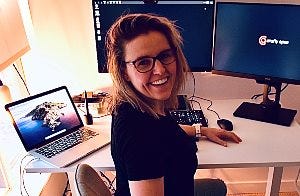Visual Effects Studio Crafty Apes Remains Online with VDI for Remote WorkVisual Effects Studio Crafty Apes Remains Online with VDI for Remote Work
Teradici partner RFX connected artists to workstations from their homes.
May 11, 2020

When COVID-19 forced Hollywood studios to shutter, visual effects studio Crafty Apes rushed to give its graphic artists remote connectivity.
The crisis affected all of Crafty Apes’ 150 visual effects editors, who work on high-end post-production projects. The company‘s recent credits include Birds of Prey, Hustlers, Jumanji: The Next Level, Star Trek: Picard and The Way Back.
Since Crafty Apes formed in 2011, editors and artists have typically performed their postproduction tasks at one of its studios. The main studio is near Los Angeles, but Crafty Apes also operates facilities in Atlanta, New York City and Vancouver. In early March, Crafty Apes expanded to Baton Rouge, and it plans to add a studio in New Mexico.
As offices started shutting down in March, like all other nonessential businesses, film production ground to a halt. But Crafty Apes had plenty of film and animation content already in the queue that was ready for post-production.
Enabling the visual effects studio’s employees to work from home was important to keep the pipeline of releases on schedule.
Crafty Apes called on RFX to come up with a practical way for its artists to remotely access their workstations. RFX, a hardware, software and services provider also based in the L.A. area, is Crafty Apes’ longtime technology provider and adviser.
State of Panic

RFX’s Prashant Buyyala
“As the coronavirus started hitting, a lot of the studios were in a state of panic,” said Prashant Buyyala. Buyyala leads technology initiatives at RFX.
Establishing remote access for graphic artists has unique requirements. It is more complex than setting up office workers to share documents or connect to customer service systems.
Crafty Apes’ artists use workstations that run compute-intensive software such as Nuke, Houdini, Autodesk Maya and Adobe Photoshop. And of course, visual content can amount to gigabytes, or even terabytes of data.
“There are severe constraints around the security implications of it, Buyyala explained.
“There are also workflow issues with regard to the large datasets that they’re working with. Some people just wanted to move the workstations home, then have the employees connect over a VPN. But that doesn’t work very well. So we really started quickly mobilizing our teams to try and take a look at the various technology solutions out there.”
Considering Various VDI Options
Because of those issues, RFX decided the best approach was to provide remote access via VDI. Buyyala said his team considered several VDI options. Among them were HP’s Remote Graphics Software (RGS), TGX’s Remote Visual Solution and Teradici’s Cloud Access Software.
RFX decided to use 10ZiG thin clients with Teradici’s Cloud Access Software.

Crafty Apes’ Aleks Siekiewicz gets ready for another day of visual effects work at Crafty Apes.
“It is the kind of software that works with media and entertainment clients,” said Cliff Edson, RFX’s general manager. “They can’t just get on and do Zoom, because of the amount of information that’s going back and forth.”
It helped that the visual effects studio already had an internal VDI platform based on Teradici’s PC over IP protocol.
“Since they were already using PC over IP in the office and for their remote branches, they were able to just extend that network to the home users,” said Ziad Lammam, Teradici’s VP of product marketing.
RFX provisioned all 150 artists within a week by letting them install …
… the 10ZiG Zero Clients to their personal PCs. Once connected, it enabled the virtual workstation environments from their computers. For those who didn’t have their own personal computers, RFX procured them through its distributors.
The editors and artists can now access their workstations from their PCs at home via the studio’s VDI infrastructure.
Performance and Security
The solution aims to ensure security by encrypting and transmitting pixels directly to the remote endpoint. Likewise, Teradici’s PC over IP protocol is optimized to render graphics at full fidelity without latency.
“It replicates like a very long, high-quality KVM extender, for lack of a better term,” Buyyala said. “It’s the equivalent of them being at their desk, but they are connecting from their homes. And they get a secure way of accessing their particular workstations.”
RFX has provided IT solutions for film production since 1978. The industry knows founder Ray Feeney for helping to develop one of the first motion control camera systems. In the early days of Star Wars, RFX was a large Silicon Graphics Inc. (SGI) reseller. Regarded for its high-performance computers in the 1990s and early 2000s, SGI is now part of Hewlett Packard Enterprise.
Increased Demand
Crafty Apes isn’t the only film production studio looking to establish remote access for their staffs.

Teradici’s Ziad Lammam
“Many of our existing high-performance customers who run studios were in that boat,” Lammam said. “We’ve been fielding quite a bit of demand from both of those types of clients.”
Besides Crafty Apes, DNEG and Scanline VFX are existing customers still using Teradici’s software for remote access, Lammam said. The crisis has also brought on some new customers from visual effects studios. Among them is Atomic Cartoons, which provisioned 800 of its animators to work from home, according to Lammam.
To accommodate the uncertain situations around COVID-19, Lammam said Teradici is providing more flexibility on software licensing. For example, the company is allowing shorter-term licenses at no extra cost, he said. Overall, Lammam said demand for Teradici’s Cloud Access Software has doubled since the pandemic forced people to work from home.
For its part, Edson said Crafty Apes’ editors and artists will work from home as long as necessary. Nevertheless, recalling the impact of the Sept. 11 terrorist attacks, Edson realizes it will take time for the industry to rebound.
“After 9-11, nothing was shot,” he said. “It lasted up to a year. Then it increased more than ever.”
While there is concern about how long this COVID-19 interruption will last, Edson said he is optimistic.
“This industry is probably more flexible than any,” he said.
About the Author
You May Also Like


